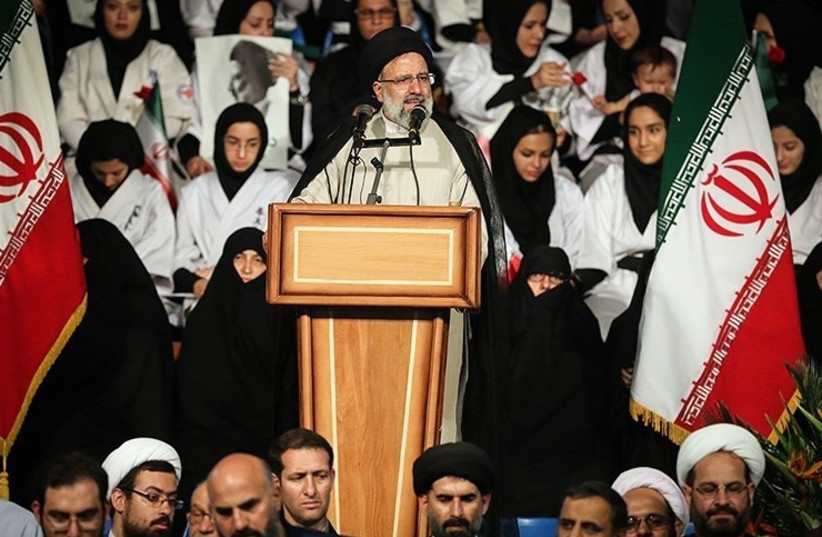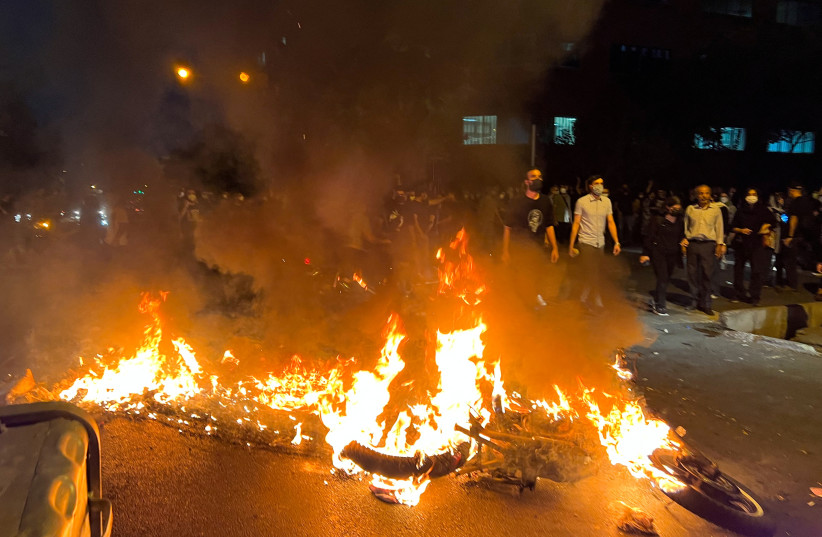by Reuters
Raisi to touch on 'most important domestic, foreign issues' • Growing death toll as protests spread to over 80 cities
 |
Ebrahim Raisi supporters campaigning in Tehran, Iran for 2017 presidential election
(photo credit: TASNIM NEWS AGENCY/CC BY 4.0 (https://creativecommons.org/licenses/by/4.0)/VIA WIKIMEDIA COMMONS)
|
Hardline President Ebrahim Raisi planned a television address to the nation on Wednesday amid a tide of anti-government unrest in Iran, with protesters chanting "death to the dictator," after the death of a young woman in police custody.
Despite a growing death toll and fierce crackdown by security forces using tear gas, clubs and, in some cases, live ammunition, social media videos showed Iranians persisting with protests, often calling for the end of the Islamic clerical establishment's more than four decades in power.
Still, a collapse of the Islamic Republic seems remote in the near term since its leaders are determined not to show weakness they believe sealed the fate of the US-backed Shah in 1979, a senior Iranian official told Reuters.
“The president will talk about the most important domestic and foreign issues facing the country in his live TV interview tonight.”
ISNA news agency
Raisi, who last week said the protests over Mahsa Amini's death were unacceptable "acts of chaos," will speak to the nation later in the day, the semi-official ISNA news agency reported.
"The president will talk about the most important domestic and foreign issues facing the country in his live TV interview tonight," ISNA said, without elaborating.

Angry demonstrations have spread to over 80 cities nationwide since the Sept. 13 death of 22-year-old Mahsa Amini, after she was arrested for "unsuitable attire" by the morality police who enforce the Islamic Republic's strict dress code.
Amini, who was from the northwestern Kurdish city of Saqez, died in hospital after falling into a coma, sparking the first big show of dissent on Iran's streets since authorities crushed protests against a rise in gasoline prices in 2019.
"We will fight, we will die, we will take Iran back," chanted protesters in Tehran's Ekbatan neighborhood, a video posted on Twitter showed.
A video from the northeastern port city of Chabahar showed riot police firing tear gas to disperse protesters, chanting "Death to (Supreme Leader Ayatollah Ali) Khamenei."
Support growing for mass protests
State media said 41 people, including members of the police and a pro-government militia, have died during the protests. Iranian human rights groups have reported a higher toll.
Dozens of Iranian celebrities, soccer players and artists - inside and outside the country - have backed the demonstrations while activists have called for a nationwide strike.
Iran's elite Revolutionary Guards said on Wednesday they fired missiles and drones at militant targets in the Kurdish region of neighboring northern Iraq, where an official said nine people were killed.
Iranian authorities have accused armed Iranian Kurdish dissidents of igniting the unrest, particularly in the northwest where most of Iran's over 10 million Kurds live.
Videos posted on activist Twitter account 1500tasvir, with 145,000 followers, showed students at Shiraz Medical School protesting against Amini's death and demanded the release of students arrested since the eruption of protests.
Early on Wednesday, a video showed protesters in Tehran chanting "Mullahs get lost!" "Death to the dictator!" and "Death to the leader (Khamenei) because of all these years of crime!"
Reuters could not verify the authenticity of videos on social media.
The UN High Commissioner for Human Rights has called on Iran's clerical rulers to "fully respect the rights to freedom of opinion, expression, peaceful assembly and association."
UN human rights office spokesperson Ravina Shamdasani said on Tuesday reports indicated "hundreds have also been arrested, including human rights defenders, lawyers, civil society activists and at least 18 journalists."
Amini's death has drawn widespread international condemnation while Iran has blamed, in addition to Kurdish dissidents, "thugs" linked to "foreign enemies" for the unrest.
Tehran has accused the United States and some European countries of using the unrest to try to destabilize the Islamic Republic.
Reuters
Source: https://www.jpost.com/breaking-news/article-718356
No comments:
Post a Comment